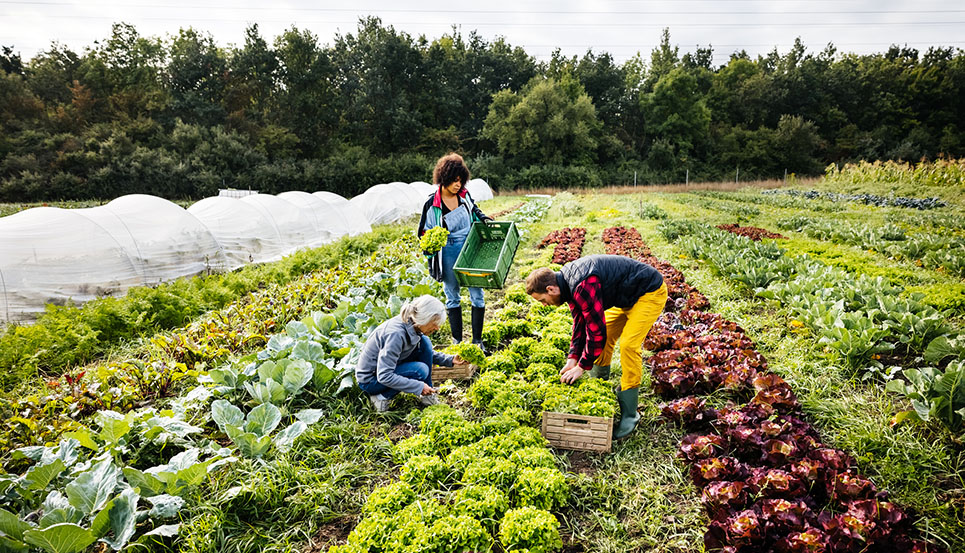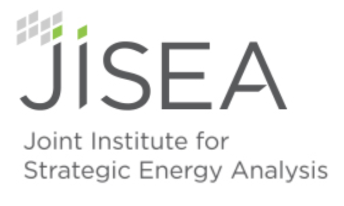JISEA Launches Sustainable Agriculture Catalyzer To Examine Cobenefits of Decarbonization

The Joint Institute for Strategic Energy Analysis (JISEA) has launched a new catalyzer—and it is changing the way you think about your food.
Catalyzers are two- to three-year seed research projects that develop research capabilities and collaborative networks centered around emerging clean energy challenges. The newest catalyzer, the Sustainable Agriculture Catalyzer, is diving into the agriculture industry and the effects decarbonization strategies can have on socioeconomics, resilience, and the environment.
"When it comes to decarbonization strategies, we are looking at the big picture," said Brittany Staie, catalyzer lead and agricultural decarbonization researcher at the National Renewable Energy Laboratory (NREL). "We're going to bring different partners to the table to expand our understanding of the impact these solutions can have outside of emissions reductions."
Sustainable agriculture has long been a focus of JISEA's work, with the institute playing a key role in the maturation of agrivoltaics research at NREL. Over the past few years, the institute has convened experts to share their insights and perspectives on research priorities in the food systems space. Most recently, agricultural decarbonization was a featured topic at the 2024 JISEA Annual Meeting with a presentation from Jordan Lambert, director of Ag Innovation at Colorado State University Spur, about the progress that has been made in U.S. dairy production and the possibilities for future emissions mitigation.
"To make progress, we have to change the way we think about the challenge of emissions in agriculture," Lambert said. "By looking at the system as a whole, we can evaluate and compare where interventions can have the most impact and how efforts can complement each other and bring the most benefit."
The Sustainable Agriculture Catalyzer will now join and amplify JISEA's portfolio of agricultural decarbonization efforts.
Catalyzing Agricultural Research and Innovation
Agricultural production accounts for approximately 12% of total greenhouse gas emissions in the United States. This footprint, along with climate change, natural resource availability concerns, and a growing population, has motivated efforts across the country to develop and implement more sustainable, resilient processes.
Decarbonization strategies can address these concerns while opening the door to cobenefits for farmers, communities, and the environment. For example, reducing emissions can lead to reduced pollutants—clearing the air for communities surrounding agricultural production and providing health benefits. Cobenefits extend beyond health to impact factors like energy equity, food security, environmental justice, workforce development, educational opportunities, and more.
The Sustainable Agriculture Catalyzer is leading the analysis of these cobenefits, aiming to get a deeper understanding of the potential benefits, trade-offs, and barriers to implementation of the various mitigation solutions. By investigating the various aspects of agricultural production, the catalyzer will highlight achievable opportunities for optimizing cobenefits of decarbonization strategies.
"The implementation of decarbonization strategies becomes even more critical when you consider how far their benefits reach," said Jordan Macknick, lead energy-water-land analyst for NREL and member of the catalyzer team. "The catalyzer is working to identify and quantify these cobenefits to help guide future decarbonization planning in a way that prioritizes the needs of farmers and the surrounding communities."
A Vibrant Landscape To Grow
The Sustainable Agriculture Catalyzer is kicking off its efforts with a new publication that will guide the catalyzer's analysis and serve as a seminal publication in the agricultural decarbonization field overall. The NREL technical report qualitatively and quantitatively analyzed agricultural decarbonization solutions and pathways in the United States, providing a first-of-its-kind comprehensive look at the mitigation potential of strategies in various agricultural systems.
In the report, researchers uncovered the lack of mitigation strategies targeting the majority of agricultural greenhouse gas emissions—nitrous oxide (N2O) and methane (CH4) emissions. Researchers also found significant opportunity for carbon sequestration in croplands but with significant barriers to implementation.
"This report highlights the leadership role that farmers and ranchers can have in the transition to a net-zero economy," said Austin Kinzer, agrivoltaics senior technical specialist with American Farmland Trust and co-author on the article. "We are encouraged by DOE's interest in collaborating across the energy and agriculture sectors to develop climate solutions that empower agricultural producers, strengthen farm viability, and promote an equitable energy transition."
The report identified a variety of cobenefits from agricultural decarbonization mitigation solutions, including increased crop yields and profits, reduced erosion, new sustainable workforce development opportunities from new agricultural technologies, and more. The Sustainable Agriculture Catalyzer will build off these findings by measuring these cobenefits to create a more holistic opportunity for prioritizing decarbonization implementation strategies. An informed approach will allow decision makers from farmers to policymakers to make better decisions.
Working Toward a Fruitful Future
The key to this catalyzer's success is in gathering collaborative input from the people who are at the forefront of implementing decarbonization strategies. Over the next few months, the catalyzer plans to host workshops to gain insights from farmers and other agricultural industry partners, including manufacturers and educational institutions, across the country.
As agricultural decarbonization research grows at NREL, the Sustainable Agriculture Catalyzer will serve as a coordinating force, bringing together the expertise from different sub-areas and drawing in diverse perspectives from partners along the way.
Read more about the Sustainable Agriculture Catalyzer and how to partner on future research.
